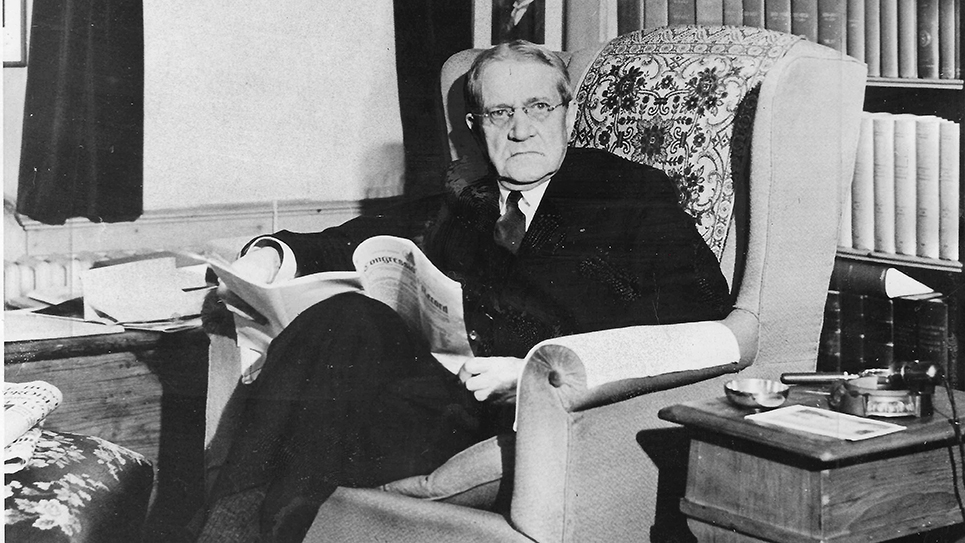Previously printed on October 5, 2015
Eleanor Medill Patterson was the first woman to successfully run a major metropolitan newspaper. Known as “Cissy” due to the nickname given to her in childhood by her brother, she was volatile, unpredictable, frequently gleefully malevolent and unquestionably gifted.
Eleanor Patterson was born into a wealthy and prominent family on November 7, 1881. Her grandfather was the owner of the Chicago Tribune and had been Mayor of Chicago. Cissy and her family would immerse themselves into the newspaper business; her brother Joseph Patterson would later become the owner and founder of the New York Daily Times, while her first cousin Robert McCormick would become the publisher of the Chicago Tribune. The New York Daily Times, the Chicago Tribune and Cissy Patterson’s Washington Herald would later be called the “three furies of isolationism” by a chagrined President Franklin Delano Roosevelt.
While the newspaper business was certainly in her blood, Cissy Patterson lived the kind of life one might expect, especially for a young woman from an exceptionally wealthy family of the time. When her uncle was appointed to serve as Ambassador to the Austro-Hungarian Empire, Cissy decided to travel to Vienna as well. Cissy had been part of an exclusive friendship with two other well-known young women, Alice Roosevelt and Margaret Cassini. Alice was the headstrong, free-thinking, and viper-tongued daughter of Theodore Roosevelt, while Margaret Cassini was the daughter of a Russian diplomat. The three young women all came from wealthy, respectable families and cut quite a swath in Washington, D. C. society where they were oftentimes referred to as the “three graces.”
It was Cissy’s love life that horrified her family, as she had apparently met one Count Felix Gizycki, a dubious Polish nobleman while accompanying her uncle to Vienna. Despite her family’s profound opposition, Cissy married County Gizycki and became Countess Gizycki. The two soon produced a daughter, Felicia, and the mother-daughter relationship would be a very complicated one indeed. Count Gizycki was deemed to be, especially by members of Cissy’s family, a fortune hunter and despite owning a substantial estate in Poland, which was then part of the Russian Empire, he was largely impecunious. Gizycki was also evidently prone to gamble when he had money, was a womanizer, and had a violent temper. Eventually, Cissy decided to leave her husband and left for London in secret, taking her child with her. An angry Count Gizycki followed her and managed to kidnap their daughter and returned to his estate in Poland. The Count was not so attached to his daughter that he would not release her into her mother’s custody, in exchange for a million dollars in cash. It was an enormous sum for the time, something like the equivalent of $23,000,000 or more in today’s money.
Count Gizycki apparently did not consider the powerful connections available to Cissy and her family. Although an agonizing process (and her divorce from the Count took some thirteen years), Cissy eventually got her daughter, although it took the intervention of Tsar Nicholas II, who ordered the Count to return the little girl to her mother. At the time, Poland was part of the Russian Empire.
Cissy owned a ranch in Jackson Hole, Wyoming, which she loved and she became an accomplished horsewoman and retained her love of horses and all animals throughout her life. As owner and publisher of the Washington Times-Herald, it was not unusual for Cissy to arrive at her office in a chauffeured limousine, accompanied by one or more of her many poodles. Cissy’s dogs were integral to her life and lived with her at her home in Washington, D. C. “Patterson House,” which still exists and is presently for sale (interested readers can find it online and get a glimpse of it); it is a magnificent marble structure and can only really be properly described as an American palace.
Cissy settled in Illinois but returned to Washington, D. C. in 1913 and she pestered her brother in the hope that she could write for his newspaper. Cissy wrote two novels and worked for publishing magnate William Randolph Hearst as well. Cissy married a successful attorney, Elmer Schlesinger, in 1925. Schlesinger died a few years later and Cissy took back her maiden name and left her Long Island estate to return to Washington, D. C. Cissy desperately wished to be in the newspaper business and pressed Hearst hard to sell her both or one of his newspapers published in Washington, D. C., the Washington Herald and the Washington Times. Hearst was having serious financial problems at the time and while he enjoyed an income worthy of a king, he spent at an astonishing rate. While he certainly needed an infusion of capital, Hearst loathed the idea of selling any of his newspapers. There were something like five newspapers published daily in the nation’s capitol and neither of Hearst’s newspapers was making money. Finally, Hearst agreed to install Cissy Patterson as editor of the Washington Herald.
After assuming the editorship of the Washington Herald on August 1, 1930, Cissy Patterson involved herself in every aspect of the paper’s publication. She revitalized the paper and promptly changed the Times from a staid and plodding publication to one more vitally interested in the most tawdry murders to women’s issues and society columns. The addition of coverage of much of Washington’s glittering society appealed to women readers, as did articles on food and fashion. Cissy hired several women to write for the Times and her changes had the effect of propelling the Washington Herald to one of the leading newspapers in Washington, D. C. It wasn’t long before Cissy Patterson had doubled the circulation of the Herald, a feat William Randolph Hearst himself had not been able to accomplish.
By 1937, William Randolph Hearst had not improved his financial situation; in fact, if anything, his need for money was even greater than it had been when Cissy Patterson was named editor of the Washington Herald. Hearst reluctantly agreed to lease Cissy the Times with an option to purchase the newspaper. Cissy finally realized her dream and in 1939, she bought both the Washington Times and the Washington Herald, merging them into the Washington Times-Herald.
Cissy’s editorial policy was perhaps more conservative than that of William Randolph Hearst, although the Times-Herald was just as strongly isolationist as any Hearst publication. Along with her brother Joe’s New York Daily News and Colonel Robert McCormick’s Chicago Tribune, the Washington Times-Herald was one of the leading isolationist newspapers in the country. Cissy’s shrewd management of the Times-Herald had made the paper into easily the newspaper with the widest circulation in the nation’s capitol, a place where its denizens took the news seriously.
Henry Luce, husband of Clare Booth Luce, sometime playwright and Congresswoman, was the owner of the august TIME magazine and LIFE, among other publications. His dislike for Cissy was likely in part for Cissy’s tart dismissal of his wife as “that lovely asp” and he derided Cissy’s newspaper as “Cissy’s henhouse.” Cissy did indeed use her newspaper to punish her enemies as well as publicly pick at issues sure to appeal to her readers. Cissy’s series on malnourished and suffering children led directly to the creation of a hot lunch program for school children.
Cissy understood the perhaps two most important aspects of running a daily newspaper: advertising and circulation. Her flamboyant personality and shrewd business sense attracted advertisers who would have nothing to do with William Randolph Hearst and of course the fact Cissy’s newspaper circulation had increased sharply appealed to potential advertisers.
Cissy Patterson relished her feuds and had little compunction in betraying some of her own friends and she once sent Eugene Meyer, owner and publisher of the rival Washington Post, a raw hunk of meat to symbolize the proverbial pound of flesh. The Jewish Meyer did not miss the reference to the Shakespearian Shylock.
Cissy Patterson had originally been somewhat supportive of Franklin Delano Roosevelt and his administration, but as time went on, her editorials were increasingly sharply critical of FDR and the New Deal, especially the president’s foreign policy. President Roosevelt wanted to prosecute Cissy and her brother Joe for treason as both had revealed U. S. Navy Intelligence had cracked the Japanese secret code. Roosevelt grudgingly let the matter drop when it became clear neither of the Pattersons would likely be convicted and there would be a firestorm of protests from the press over the administration persecuting its enemies. An unrepentant Cissy snarled, “Do you think he arranged this?”
Cissy’s daughter Felicia had married Drew Pearson, who became one of the leading “muckraking” journalists of his time. Unfortunately, the two divorced after having a daughter of their own. Cissy found oftentimes creative ways to torture Pearson and fought with her daughter Felicia ferociously. Felicia issued a statement in 1945 that she was “divorcing” her mother following an alcohol-fueled altercation at the dinner table.
Felicia began her own tirade with, “God damn you, and may you roast in hell…”
Cissy airily began her own retort with, “You’re much too fat…”
Cissy’s love life was thoroughly unconventional for the time and she became increasingly fond of and dependent upon alcohol as she aged. Cissy divided her time between Patterson House and another home she owned in Maryland, Dower House. Cissy remained deeply involved in the running of her newspaper, paying attention to even the smallest details.
Cissy died sometime during the early morning hours of July 24, 1948, at age sixty-six. Cissy had become more suspicious and fearful during her last days, seeming to think she might be in some danger and there are those who think the publisher might have been murdered.
Cissy Patterson was found sprawled in her bed at Dower House, her head hanging over the side and her hair hanging over her face. The apparent cause of her death was a sudden heart attack.
Not surprisingly, Cissy left an enormous estate valued at approximately $160,000,000 in today’s currency. Her most prized possession was the Washington Times-Herald, which she left to seven employees at the newspaper. Unlike William Randolph Hearst, the foremost publishing magnate of his time, Cissy Patterson had managed to take two failing newspapers and turn them into a money-making enterprise and the leading newspaper in the nation’s capitol.
Despite being alienated from her mother, Felicia apparently expected to inherit the bulk of Cissy’s estate. One of Cissy’s hobbies had been writing and redrafting her will, making bequests to those who were in her good graces at the time, while removing those who had transgressed in some way in her eyes. Felicia finally dropped her suit, after receiving a modest settlement.
Her heirs would have disappointed her terribly, as they sold the Times-Herald to Cissy’s cousin, Colonel Robert McCormick. Neither the “Seven Dwarves” who inherited the Times-Herald nor Colonel McCormick could seemingly run the newspaper as well as Cissy had and it was losing money. McCormick held onto the Times-Herald for five years before finally selling it to Eugene Meyer, owner of the Washington Post. Meyer bought the Times-Herald and promptly closed it.
Not only did Cissy Patterson not leave her daughter her spectacular fortune, but she also didn’t leave Felicia either Patterson House or Dower House. Felicia did inherit a tidy sum and spent the remainder of her days reliving much of her relationship with her larger-than-life mother, finally dying in 1999.
Eleanor Medill Patterson was a woman of strong opinions, flawed like almost every human being, and lived large. Yet, Cissy Patterson proved to be more than the spoiled child of extraordinarily wealthy parents; she was an adept and shrewd businesswoman with an eye toward what appealed to readers. Many of the improvements made by Cissy Patterson at her own newspaper became standard practices in the newspaper industry. Cissy Patterson succeeded where many others had failed and was a woman at a time when her own industry was almost exclusively male. Cissy Patterson truly was a titan in her own time.






